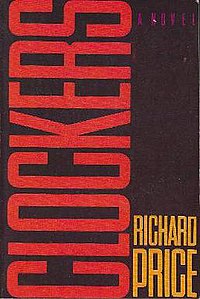 Clockers
Clockers is by Richard Price. Richard Price is a novelist, mostly of crime novels, but also a screenwriter. One of the screens for which he writes is the television, and as someone with zero authority on these things, I feel totally qualified to say that his best work for said medium was undoubtedly for
The Wire, which, if you have not seen it, is the greatest non-comedic television show in the history of everything. Based of readings of
Clockers and his more recent, mostly superior novel
, Lush Life, what Richard Price brought to the show (and brings to his books) is a deep understanding of the humanity that everyone exemplifies, whether that person be drug dealer or dope fiend, hitman or homicide police. Everyone gets a fair shake from Richard Price, which means no cop is perfect and no clocker is evil.
Clockers follows two characters, in alternating chapters, and the worlds they inhabit. Ronald "Strike" Dunham is a lieutenant in a heroin selling operation in a New Jersey project. He is quiet, careful, and unassuming, and good at his job, which he believes he is doing only long enough to save up to move away and do something else. He will eventually cross paths, following the murder of another dope dealer, with Detective Rocco Klein, a New Jersey Homicide detective who, despite receiving a confession and weapon from a supposed suspect, has the case in his sights and refuses to give up until he is satisfied that he has gotten to the bottom of it. Strike is a mostly sympathetic character, with his bleeding ulcer and his wanting to do good by a local boy named Tyrone. But he is a drug dealer, at the end of the day. Rocco is mostly good, but drinks heavily, avoids his wife and young daughter, and may or may not have the wrong man. Eventually everyone comes together and the murder is solved and people are done right by or wrong by, and we meet a whole host of characters in the projects and the policestation.
This novel, like all Price, as far as i know, is a loving but gritty and uber-realistic look into a fascinating world. Clockers could have been the story arc for any season of the wire, if it was transplanted a few hundred miles south to Baltimore. That being said, the book is long (over 600 pages! How!) and isn't as engrossing a read as
Lush Life. But if you haven't seen the wire yet, do yourself a favor, and spend your time on that.
 Too fat to Frug,
Too fat to Frug,


 This book totally rocked my socks off. Moment after moment of jaw-dropping horror fantasy...Dead letter rooms leading to astral traveling through time loops; warring demigods; an evil comedian lording over a Hollywood funhouse. Totally yummy.
This book totally rocked my socks off. Moment after moment of jaw-dropping horror fantasy...Dead letter rooms leading to astral traveling through time loops; warring demigods; an evil comedian lording over a Hollywood funhouse. Totally yummy.Paper.jpg) Hokay.
Hokay. We talk about this book all the time. It's been my favorite book since the moment I finished it. But that was four years ago. I thought it might be time to return.
We talk about this book all the time. It's been my favorite book since the moment I finished it. But that was four years ago. I thought it might be time to return. Hey, bookish chums! Wow, I haven't written or read anything in ages! (I've read SOME things, just not "books." Terrible plays, mostly. Less rewarding, as it turns out, than you'd think!)
Hey, bookish chums! Wow, I haven't written or read anything in ages! (I've read SOME things, just not "books." Terrible plays, mostly. Less rewarding, as it turns out, than you'd think!)